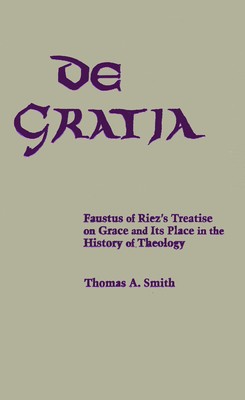
- We will send in 10–14 business days.
- Author: Thomas A Smith
- Publisher: University of Notre Dame Press
- ISBN-10: 0268008663
- ISBN-13: 9780268008666
- Format: 15.2 x 22.9 x 1.9 cm, kieti viršeliai
- Language: English
- SAVE -10% with code: EXTRA
Reviews
Description
The treatise De gratia was written in 474 by Faustus, bishop of Riez in southern Gaul, against the predestinarian doctrine of Lucidus, a Gallic priest. The present study reexamines that treatise. The need for such a reexamination becomes clear as one reads the many and varied, and often polemical, estimates of Faustus's doctrinal orthodoxy. It is hoped that in the course of such study historical, theological, and literary in its scope-we will be better equipped to evaluate the many interpretations of Faustus. Perhaps, too, we will be able to shed some helpful new light on the ways in which Augustinian teachings on grace were received in Gaul between St. Augustine's death in 430 and the so-called second council of Orange in 529. In these introductory remarks we will survey in brief scope the reception accorded the De gratia in the history of Christian thought. At the end of his study of the history of criticism of Faustus, Tibiletti alludes briefly to the important revision that has taken place in modern scholarship on Pelagius. If moderns are now able to regard Pelagius with some equanimity, even if not with full approbation, there is all the more reason to undertake a profound historical and philological reexamination of Faustus of Riez. In this way his authentic voice can be heard, apart from the accretions of later accusations. The following study does not pretend to be the profound historical and philological reexamination called for, but I hope that it will begin to clarify the direction of such inquiry. It will be the first work devoted entirely to an understanding of the De gratia in its historical, literary, and theological contexts. Having undertaken this task, we will be rewarded with a more precise understanding of the reception of Augustinianism in fifth-century Gaul.
EXTRA 10 % discount with code: EXTRA
The promotion ends in 23d.18:40:11
The discount code is valid when purchasing from 10 €. Discounts do not stack.
- Author: Thomas A Smith
- Publisher: University of Notre Dame Press
- ISBN-10: 0268008663
- ISBN-13: 9780268008666
- Format: 15.2 x 22.9 x 1.9 cm, kieti viršeliai
- Language: English English
The treatise De gratia was written in 474 by Faustus, bishop of Riez in southern Gaul, against the predestinarian doctrine of Lucidus, a Gallic priest. The present study reexamines that treatise. The need for such a reexamination becomes clear as one reads the many and varied, and often polemical, estimates of Faustus's doctrinal orthodoxy. It is hoped that in the course of such study historical, theological, and literary in its scope-we will be better equipped to evaluate the many interpretations of Faustus. Perhaps, too, we will be able to shed some helpful new light on the ways in which Augustinian teachings on grace were received in Gaul between St. Augustine's death in 430 and the so-called second council of Orange in 529. In these introductory remarks we will survey in brief scope the reception accorded the De gratia in the history of Christian thought. At the end of his study of the history of criticism of Faustus, Tibiletti alludes briefly to the important revision that has taken place in modern scholarship on Pelagius. If moderns are now able to regard Pelagius with some equanimity, even if not with full approbation, there is all the more reason to undertake a profound historical and philological reexamination of Faustus of Riez. In this way his authentic voice can be heard, apart from the accretions of later accusations. The following study does not pretend to be the profound historical and philological reexamination called for, but I hope that it will begin to clarify the direction of such inquiry. It will be the first work devoted entirely to an understanding of the De gratia in its historical, literary, and theological contexts. Having undertaken this task, we will be rewarded with a more precise understanding of the reception of Augustinianism in fifth-century Gaul.


Reviews